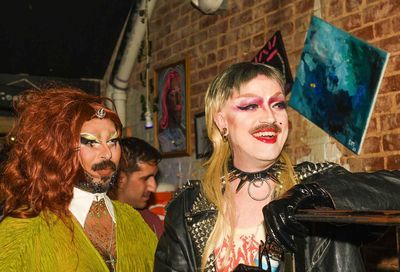Court Strikes Down Law Criminalizing Gay Sex in Saint Kitts and Nevis
Regional court finds anti-sodomy law is unconstitutional, violating LGBTQ people's rights to liberty and privacy.

A regional court covering nine different Caribbean nations and territories has struck down a colonial-era law in Saint Kitts and Nevis criminalizing same-sex relations between consenting adults.
The Eastern Caribbean Supreme Court ruled that two portions of the dual-island nation’s “Offences Against the Person Act,” first passed in 1873, were unconstitutional, finding that sexual orientation and same-sex intimacy are covered by the right to privacy.
Under the Victorian-era law, a person could be imprisoned for up to 10 years for having or attempting to have gay sex.
In a demonstration of how strong anti-gay sentiment still remains in the region, while the original law, which has rarely been invoked, only penalized people for four years, lawmakers amended the law in 2012 to increase the penalty to 10 years, adding the possibility of hard labor to any sentence.
The lawsuit challenging the law was brought by Jamal Jeffers, a gay man, and an LGBTQ nonprofit advocacy organization called Saint Kitts and Nevis Alliance for Equality.
In their complaint, the plaintiffs argued that the right to liberty allows people to choose an intimate partner and have consensual sex with whomever and however they want. They also argued the right to privacy in the local constitution is not limited to protection against unlawful searches, reports The Washington Post.
The country’s attorney general, on behalf of the local government, had argued in court that the right to freedom of expression does not apply to sexual orientation or include the right to identify as LGBTQ.
The attorney general’s office also argued that moral norms — including Christian beliefs opposing homosexuality that were forced upon the descendants of slaves bought to the islands and forcibly converted by European colonizers — were deeply rooted in the nation’s culture.
“Any deviation from these fundamental beliefs opens the floodgates to practices that could alter and compromise survival of the culture and personality of the Federation,” the government argued, adding that the nation was “established on the belief in Almighty God and the inherent dignity in each individual.”
The chairman of the Evangelical Association of Saint Kitts, representing around 30 Christian churches, had filed an affidavit in support of the law, arguing that “the moral and religious fiber of the community should influence any interpretation of the Constitution.”
But the Eastern Caribbean Supreme Court rejected those arguments, finding that “public morality is not synonymous with religious dogma or public opinion.”
High Court Judge Trevor Ward, writing for the court in a decision dated Aug. 29, found that the two sections of the 1873 law dealing with sodomy impinge “upon the claimants’ right to determine the way they, as individuals, choose to express their sexuality in private with another consenting adult.”
He found the two sections are inconsistent with the rest of the rights granted in the country’s constitution, “and, as such, [are] null and void and of no force and effect.”
LGBTQ activists celebrated the ruling as a relief for LGBTQ people, who had been forced to closet themselves and tended to avoid medical care for fear of being stigmatized, losing their job, being assaulted, or being prosecuted by the government on suspicion of violating the anti-sodomy provisions in the 1873 law.
“We have achieved history,” Kenita Placide, the executive director of the Eastern Caribbean Alliance for Diversity and Equality, said in a statement. “An affirmative decision means a yes to privacy and a yes to freedom of expression.”
As Reuters notes, anti-sodomy or “buggery” laws remain on the books in many Caribbean nations that still cleve to Victorian-era laws and mores, including Jamaica and Barbados.
Previously, courts in Belize, Trinidad & Tobago, and Antigua & Barbuda have overturned their anti-sodomy laws.
The most recent ruling came in July, when Antigua & Barbuda’s High Court ruled that the anti-buggery provisions in its colonial-era law violate a person’s right to liberty, protection of law, and freedom of discrimination, including discrimination on the basis of gender.
Other cases challenging anti-sodomy laws in Barbados and Saint Lucia are pending. However, the fact that the Eastern Caribbean Supreme Court rejected the anti-sodomy provisions in Saint Kitts and Nevis gives hope to other LGBTQ activists in the region, as the court currently oversees Saint Lucia, Grenada, Saint Vincent and the Grenadines, the Commonwealth of Dominica, and the British Overseas Territories of Anguilla, the British Virgin Islands, and Montserrat.
Support Metro Weekly’s Journalism
These are challenging times for news organizations. And yet it’s crucial we stay active and provide vital resources and information to both our local readers and the world. So won’t you please take a moment and consider supporting Metro Weekly with a membership? For as little as $5 a month, you can help ensure Metro Weekly magazine and MetroWeekly.com remain free, viable resources as we provide the best, most diverse, culturally-resonant LGBTQ coverage in both the D.C. region and around the world. Memberships come with exclusive perks and discounts, your own personal digital delivery of each week’s magazine (and an archive), access to our Member's Lounge when it launches this fall, and exclusive members-only items like Metro Weekly Membership Mugs and Tote Bags! Check out all our membership levels here and please join us today!




























You must be logged in to post a comment.